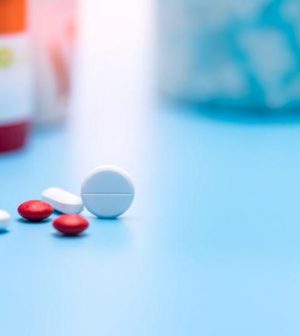- Could Your Grocery Store Meat Be Causing Recurring UTIs?
- Are You Making This Expensive Thermostat Error This Winter?
- Recognizing the Signs of Hypothyroidism
- 10 Strategies to Overcome Insomnia
- Could Artificial Sweeteners Be Aging the Brain Faster?
- Techniques for Soothing Your Nervous System
- Does the Water in Your House Smell Funny? Here’s Why
- Can a Daily Dose of Apple Cider Vinegar Actually Aid Weight Loss?
- 6 Health Beverages That Can Actually Spike Your Blood Sugar
- Treatment Options for Social Anxiety Disorder
Medicare Could Save Millions By Taking Cue from Mark Cuban’s Online Pharmacy

(HealthDay News) – Medicare might want to take note of the pricing strategy of a new online pharmacy run by tech entrepreneur and “Shark Tank” judge Mark Cuban if it wants to save billions on prescription drugs, a new study suggests.
Cuban’s Cost Plus Drug offers certain generic drugs at cheaper prices by selling them at a markup of 15% plus a $3 flat fee. Patients pay for the medications, which include the blood pressure drug Lisinopril and the antidepressant Prozac (fluoxetine), out of pocket because Cost Plus doesn’t accept insurance. It also doesn’t sell brand-name drugs.
The new study found that if Medicare was paying the same prices, it would have saved nearly $4 billion in 2020.
“Medicare is overpaying for some of the generic drugs,” study author Dr. Hussain Saleem Lalani, a researcher at Brigham and Women’s Hospital in Boston, told NBC News. “And this is a conservative estimate, so the actual savings are likely higher.”
Medicare “could save a lot more money if it had stricter policies on how it paid for drugs,” Lalani said. “There’s a lot more reforms that could be done to optimize the generic drug pricing system, and we should really consider doing those things to lower costs for patients.”
The research team looked at the prices of 89 generic drugs sold by Cost Plus Drug in 2022, comparing them to the prices for those same drugs paid by Medicare Part D plans in 2020. Then, they adjusted for changes in drug costs between the two years.
The study found that Medicare paid more than Cost Plus for 77 generic drugs. The total dollars spent was $8.1 billion compared to the $4.5 billion that it could have cost. It’s not clear if out-of-pocket costs would have been lower for enrollees in the Medicare plan if the drugs were cheaper.
Juliette Cubanski, deputy director of the program on Medicare policy at the Kaiser Family Foundation, told NBC News that the study raised the question about whether Medicare plans are leaving money on the table.
Right now, price negotiation is “just a completely black box. There’s not a lot of transparency,” Cubanski added.
“We’re kind of putting the burden on the patients to chase down lower prescription drug prices as opposed to kind of finding ways to make them widely accessible,” she said.
Cubanski did note that the types of medications patients typically have trouble paying for are brand-name drugs, not generic ones. Democrats have called for laws that would allow Medicare to negotiate directly to lower the prices of the most expensive drugs.
“Saving $3.6 billion is certainly worth pursuing if there’s an opportunity to get that amount of savings,” Cubanski said. But most of the dollars from Medicare “are going to higher-priced, brand name and specialty drugs.”
The study’s limitations include that researchers could only compare pricing on the drugs covered by Cuban’s company, which account for only about 25% of the drugs included in Medicare Part D’s $38 billion in spending in 2020.
Lalani called for a closer look at the prescription drug pricing system, which includes wholesalers, pharmacy benefit managers, pharmacies and insurers.
The findings were published Monday in the journal Annals of Internal Medicine.
More information
Kaiser Family Foundation has more on public opinion on prescription drugs and their prices.
Source: HealthDay
Copyright © 2026 HealthDay. All rights reserved.










